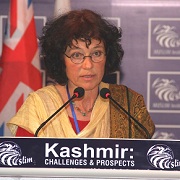  |
Oppressed people all around the world felt encouraged by the Arab Spring and so did Kashmiris who had already been struggling for freedom for last 6 decades. Already many times the momentum was there for a Kashmiri Spring but despite massive street protests of Kashmiri youth and over one hundred tragic casualties in one month time, in the latest sequence of protests due to army or police bullets, it never came to its final phase. Can and does the Arab Spring encourage a Kashmiri Spring? Has time come? In Kashmir, civil society suffers under the weight of draconian politics and militarism and has become paralyzed.
In 1989, the end of Afghan war as well as the euphoria of Berlin Wall to fall, gave the Kashmiri youth a sense of freedom on the horizon. They, however, were convinced that freedom could not be achieved without international support. The cause of Kashmir had to be internationalized and needed international attention and solidarity and this, they reasoned, could only be triggered by violent uprising. Their protests and call for freedom was, however, brutally replied by Indian authorities with installation of over one million (1.000.000) military and paramilitary forces in order to suppress revolt and to discourage civilians to practically, or even morally, support the armed struggle. Ever since, omnipresence of Indian army and security forces all over Indian administered Kashmir and draconian ‘anti-terrorism’ laws e.g. ASPA / All Special Powers Act aim to keep Kashmiris under Indian thumb and prevent mass protests against the socio-political status quo, large scale and daily human rights violations and impunity for perpetrators of human rights violations paralyze civil society on the ground up till today.
Human rights defenders, families of the disappeared, students, intellectuals and other sections of Kashmiri civil society, nevertheless, persist in their public protests. Any incident (e.g. rape of civilians by Indian army personnel) or event (e.g. national celebration of Independence Day) still provokes massive street protests or strikes in Indian administered Jammu Kashmir. These protests boost people’s individual human dignity as men and women who resist humiliation and injustice. But they also paralyze socio-economic life and fuel further distrust in local and national establishment, and are consequently followed by a hard response by army and security forces. It is an endless circle of action-reaction. Kashmiri civil society activists and human rights defenders concluded that violence is not the way out and call for nonviolence as means for conflict resolution. Thus, in last two decades, human rights defenders, peace-activists and former militants deliberately and successfully have focused on documenting human rights violations and on advocating the right to self-determination as their basic human right indeed.
Various efforts have been undertaken by American and European officials to mediate in regard of the Kashmir Dispute. However, such mediation endeavors so far proved fruitless and faced strong obstruction by vested interests discouraging the international community to be pro-active. Europe is fighting a desperate battle to prevent political implosion due to serious economic crises in its member-states, whereas the USA feels itself stuck in more global wars than ever before. Thus, Europe and USA tend to prefer to remove ‘Kashmir’ from their agenda for the time being. Many international diplomats and politicians hesitate to engage in direct talks on Kashmir and fear that talking to the Kashmiri themselves means to risk very promising trade relations with India.
Local and international civil society groups, think-tanks and diplomats advocate and reiterate that Kashmir has to be acknowledged as a most urgent issue on bilateral negotiating agenda between Pakistan and India. The people of Kashmir and their leaders should be acknowledged as stakeholder in the process of socio-political transition to sustainable peace. To get out of the deadlock, genuine civil society actors ‘on the ground’ are crucial to be acknowledged in their role in changing the status quo of ongoing human rights violations, impunity and injustice due to Black Laws and military occupation. Courage and persistence of the Kashmiris on the ground has happily and unhappily surprised regional as well as global powers, and has kept Kashmir on the radar of international human rights organizations and lobbyists in various diplomatic platforms.
In last two decades, Kashmir passed through various ‘Springs’ already. Regional and international powers are obliged to finally give ‘Summer’ a chance for Kashmiris: ‘An Everlasting Summer’ is what the people deserve after all sacrifices and persistence in opposing human rights violations and impunity. ‘An Everlasting Summer in Kashmir’ is the key for sustainable peace, justice and freedom in this very region of concern, in Kashmir, and, yes indeed, in the world at large.
|